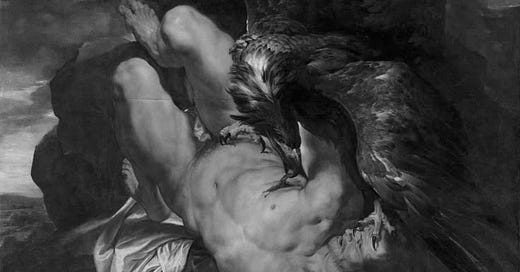I.
Titan! to whose immortal eyes
The sufferings of mortality,
Seen in their sad reality,
Were not as things that gods despise;
What was thy pity's recompense?
A silent suffering, and intense;
The rock, the vulture, and the chain,
All that the proud can feel of pain,
The agony they do not show,
The suffocating sense of woe,
Which speaks but in its loneliness,
And then is jealous lest the sky
Should have a listener, nor will sigh
Until its voice is echoless.
II.
Titan! to thee the strife was given
Between the suffering and the will,
Which torture where they cannot kill;
And the inexorable Heaven,[66]
And the deaf tyranny of Fate,
The ruling principle of Hate,
Which for its pleasure doth create
The things it may annihilate,
Refused thee even the boon to die:
The wretched gift Eternity
Was thine - and thou hast borne it well.
All that the Thunderer wrung from thee
Was but the menace which flung back
On him the torments of thy rack;
The fate thou didst so well foresee,
But would not to appease him tell;
And in thy Silence was his Sentence,
And in his Soul a vain repentance,
And evil dread so ill dissembled,
That in his hand the lightnings trembled.
III.
Thy Godlike crime was to be kind,
To render with thy precepts less
The sum of human wretchedness,
And strengthen Man with his own mind;
But baffled as thou wert from high,
Still in thy patient energy,
In the endurance, and repulse
Of thine impenetrable Spirit,
Which Earth and Heaven could not convulse,
A mighty lesson we inherit:
Thou art a symbol and a sign
To Mortals of their fate and force;
Like thee, Man is in part divine,
A troubled stream from a pure source;
And Man in portions can foresee
His own funereal destiny;
His wretchedness, and his resistance,
And his sad unallied existence:
To which his Spirit may oppose
Itself - an equal to all woes -
And a firm will, and a deep sense,
Which even in torture can descry
Its own concentered recompense,
Triumphant where it dares defy,
And making Death a Victory.
Lord Byron’s Prometheus is a Romantic ode that transforms the mythic Titan into a powerful symbol of moral defiance, human suffering, and spiritual endurance. In this portrayal, Prometheus is not just a rebel against divine tyranny—he becomes a Christ-like figure who suffers not for crime, but for kindness. His punishment is not death, but eternal torment, and yet he endures it in silence. Byron elevates this silence into an act of resistance more powerful than words—a judgment upon the tyrant Zeus himself. The poem explores the nobility of concealed pain, the dignity in unbroken will, and the triumph found not in escape from suffering, but in the refusal to be crushed by it.
In the final stanza, Byron universalizes the Titan’s story, turning Prometheus into a metaphor for mankind. Like the Titan, man is “in part divine,” drawn from a pure source yet troubled and alone. Though burdened by fate, mortality, and isolation, the human spirit—when it resists—achieves a kind of victory, even in death. The poem’s core message is that true greatness lies not in conquest, but in the courage to endure with dignity. Byron crafts a vision of man as heroic not in power, but in perseverance—a theme central to Romanticism and deeply resonant with the human condition.





I recently completed a trip through selections of the Romantic poets and found Byron to not be my favorite (though Shelley was my least favorite by far).
This is amongst his best and a really good work. “A troubled stream from a pure source” is magnificent. I’ll have to revisit him.